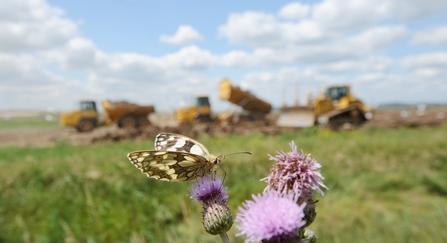Following consecutive years of reporting on the depleted state of our nature and the erosion of environmental protections, new regulation introducing world leading ‘Biodiversity Net Gain’ (BNG) was a welcome moment, giving renewed optimism for nature restoration across England.
Just two years on, the Government’s approach to stimulating GDP growth by building all over Britain is sending nature to the top of the risk register.
What is BNG?
The purpose of BNG is to ensure that the environment across the whole of England is improved by development and not diminished by it.
BNG requires developers to deliver a 10% uplift in biodiversity post-development against the level of biodiversity pre-development. This BNG requirement sits on top of all existing environmental rules, it does not weaken protections but facilitates the creation of new habitats.
Biodiversity uplift can be delivered within the development site or off site, judged by applying the mitigation hierarchy; meaning, if the offset is to occur off site, developers can pay for biodiversity gains on land they do not own.


